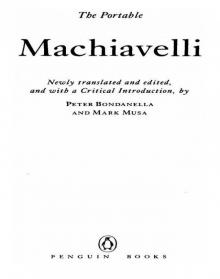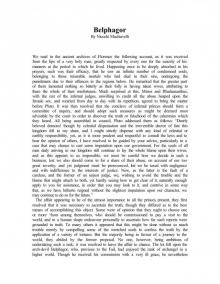- Home
- Niccolo Machiavelli
Valentino Page 11
Valentino Read online
Page 11
declare yourself and to make war strenuously; because, in the first
case, if you do not declare yourself, you will invariably fall a prey
to the conqueror, to the pleasure and satisfaction of him who has been
conquered, and you will have no reasons to offer, nor anything to
protect or to shelter you. Because he who conquers does not want
doubtful friends who will not aid him in the time of trial; and he who
loses will not harbour you because you did not willingly, sword in
hand, court his fate.
Antiochus went into Greece, being sent for by the Aetolians to drive
out the Romans. He sent envoys to the Achaeans, who were friends of
the Romans, exhorting them to remain neutral; and on the other hand
the Romans urged them to take up arms. This question came to be
discussed in the council of the Achaeans, where the legate of
Antiochus urged them to stand neutral. To this the Roman legate
answered: "As for that which has been said, that it is better and more
advantageous for your state not to interfere in our war, nothing can
be more erroneous; because by not interfering you will be left,
without favour or consideration, the guerdon of the conqueror." Thus
it will always happen that he who is not your friend will demand your
neutrality, whilst he who is your friend will entreat you to declare
yourself with arms. And irresolute princes, to avoid present dangers,
generally follow the neutral path, and are generally ruined. But when
a prince declares himself gallantly in favour of one side, if the
party with whom he allies himself conquers, although the victor may be
powerful and may have him at his mercy, yet he is indebted to him, and
there is established a bond of amity; and men are never so shameless
as to become a monument of ingratitude by oppressing you. Victories
after all are never so complete that the victor must not show some
regard, especially to justice. But if he with whom you ally yourself
loses, you may be sheltered by him, and whilst he is able he may aid
you, and you become companions on a fortune that may rise again.
In the second case, when those who fight are of such a character that
you have no anxiety as to who may conquer, so much the more is it
greater prudence to be allied, because you assist at the destruction
of one by the aid of another who, if he had been wise, would have
saved him; and conquering, as it is impossible that he should not do
with your assistance, he remains at your discretion. And here it is to
be noted that a prince ought to take care never to make an alliance
with one more powerful than himself for the purposes of attacking
others, unless necessity compels him, as is said above; because if he
conquers you are at his discretion, and princes ought to avoid as much
as possible being at the discretion of any one. The Venetians joined
with France against the Duke of Milan, and this alliance, which caused
their ruin, could have been avoided. But when it cannot be avoided, as
happened to the Florentines when the Pope and Spain sent armies to
attack Lombardy, then in such a case, for the above reasons, the
prince ought to favour one of the parties.
Never let any Government imagine that it can choose perfectly safe
courses; rather let it expect to have to take very doubtful ones,
because it is found in ordinary affairs that one never seeks to avoid
one trouble without running into another; but prudence consists in
knowing how to distinguish the character of troubles, and for choice
to take the lesser evil.
A prince ought also to show himself a patron of ability, and to honour
the proficient in every art. At the same time he should encourage his
citizens to practise their callings peaceably, both in commerce and
agriculture, and in every other following, so that the one should not
be deterred from improving his possessions for fear lest they be taken
away from him or another from opening up trade for fear of taxes; but
the prince ought to offer rewards to whoever wishes to do these things
and designs in any way to honour his city or state.
Further, he ought to entertain the people with festivals and
spectacles at convenient seasons of the year; and as every city is
divided into guilds or into societies,[*] he ought to hold such bodies
in esteem, and associate with them sometimes, and show himself an
example of courtesy and liberality; nevertheless, always maintaining
the majesty of his rank, for this he must never consent to abate in
anything.
[*] "Guilds or societies," "in arti o in tribu." "Arti" were craft or
trade guilds, cf. Florio: "Arte . . . a whole company of any trade
in any city or corporation town." The guilds of Florence are most
admirably described by Mr Edgcumbe Staley in his work on the
subject (Methuen, 1906). Institutions of a somewhat similar
character, called "artel," exist in Russia to-day, cf. Sir
Mackenzie Wallace's "Russia," ed. 1905: "The sons . . . were
always during the working season members of an artel. In some of
the larger towns there are artels of a much more complex kind--
permanent associations, possessing large capital, and pecuniarily
responsible for the acts of the individual members." The word
"artel," despite its apparent similarity, has, Mr Aylmer Maude
assures me, no connection with "ars" or "arte." Its root is that
of the verb "rotisya," to bind oneself by an oath; and it is
generally admitted to be only another form of "rota," which now
signifies a "regimental company." In both words the underlying
idea is that of a body of men united by an oath. "Tribu" were
possibly gentile groups, united by common descent, and included
individuals connected by marriage. Perhaps our words "septs" or
"clans" would be most appropriate.
CHAPTER XXII
CONCERNING THE SECRETARIES OF PRINCES
The choice of servants is of no little importance to a prince, and
they are good or not according to the discrimination of the prince.
And the first opinion which one forms of a prince, and of his
understanding, is by observing the men he has around him; and when
they are capable and faithful he may always be considered wise,
because he has known how to recognize the capable and to keep them
faithful. But when they are otherwise one cannot form a good opinion
of him, for the prime error which he made was in choosing them.
There were none who knew Messer Antonio da Venafro as the servant of
Pandolfo Petrucci, Prince of Siena, who would not consider Pandolfo to
be a very clever man in having Venafro for his servant. Because there
are three classes of intellects: one which comprehends by itself;
another which appreciates what others comprehended; and a third which
neither comprehends by itself nor by the showing of others; the first
is the most excellent, the second is good, the third is useless.
Therefore, it follows necessarily that, if Pandolfo was not in the
first rank, he was in the second, for whenever one has judgment to
kn
ow good and bad when it is said and done, although he himself may
not have the initiative, yet he can recognize the good and the bad in
his servant, and the one he can praise and the other correct; thus the
servant cannot hope to deceive him, and is kept honest.
But to enable a prince to form an opinion of his servant there is one
test which never fails; when you see the servant thinking more of his
own interests than of yours, and seeking inwardly his own profit in
everything, such a man will never make a good servant, nor will you
ever be able to trust him; because he who has the state of another in
his hands ought never to think of himself, but always of his prince,
and never pay any attention to matters in which the prince is not
concerned.
On the other hand, to keep his servant honest the prince ought to
study him, honouring him, enriching him, doing him kindnesses, sharing
with him the honours and cares; and at the same time let him see that
he cannot stand alone, so that many honours may not make him desire
more, many riches make him wish for more, and that many cares may make
him dread chances. When, therefore, servants, and princes towards
servants, are thus disposed, they can trust each other, but when it is
otherwise, the end will always be disastrous for either one or the
other.
CHAPTER XXIII
HOW FLATTERERS SHOULD BE AVOIDED
I do not wish to leave out an important branch of this subject, for it
is a danger from which princes are with difficulty preserved, unless
they are very careful and discriminating. It is that of flatterers, of
whom courts are full, because men are so self-complacent in their own
affairs, and in a way so deceived in them, that they are preserved
with difficulty from this pest, and if they wish to defend themselves
they run the danger of falling into contempt. Because there is no
other way of guarding oneself from flatterers except letting men
understand that to tell you the truth does not offend you; but when
every one may tell you the truth, respect for you abates.
Therefore a wise prince ought to hold a third course by choosing the
wise men in his state, and giving to them only the liberty of speaking
the truth to him, and then only of those things of which he inquires,
and of none others; but he ought to question them upon everything, and
listen to their opinions, and afterwards form his own conclusions.
With these councillors, separately and collectively, he ought to carry
himself in such a way that each of them should know that, the more
freely he shall speak, the more he shall be preferred; outside of
these, he should listen to no one, pursue the thing resolved on, and
be steadfast in his resolutions. He who does otherwise is either
overthrown by flatterers, or is so often changed by varying opinions
that he falls into contempt.
I wish on this subject to adduce a modern example. Fra Luca, the man
of affairs to Maximilian,[*] the present emperor, speaking of his
majesty, said: He consulted with no one, yet never got his own way in
anything. This arose because of his following a practice the opposite
to the above; for the emperor is a secretive man--he does not
communicate his designs to any one, nor does he receive opinions on
them. But as in carrying them into effect they become revealed and
known, they are at once obstructed by those men whom he has around
him, and he, being pliant, is diverted from them. Hence it follows
that those things he does one day he undoes the next, and no one ever
understands what he wishes or intends to do, and no one can rely on
his resolutions.
[*] Maximilian I, born in 1459, died 1519, Emperor of the Holy Roman
Empire. He married, first, Mary, daughter of Charles the Bold;
after her death, Bianca Sforza; and thus became involved in
Italian politics.
A prince, therefore, ought always to take counsel, but only when he
wishes and not when others wish; he ought rather to discourage every
one from offering advice unless he asks it; but, however, he ought to
be a constant inquirer, and afterwards a patient listener concerning
the things of which he inquired; also, on learning that nay one, on
any consideration, has not told him the truth, he should let his anger
be felt.
And if there are some who think that a prince who conveys an
impression of his wisdom is not so through his own ability, but
through the good advisers that he has around him, beyond doubt they
are deceived, because this is an axiom which never fails: that a
prince who is not wise himself will never take good advice, unless by
chance he has yielded his affairs entirely to one person who happens
to be a very prudent man. In this case indeed he may be well governed,
but it would not be for long, because such a governor would in a short
time take away his state from him.
But if a prince who is not inexperienced should take counsel from more
than one he will never get united counsels, nor will he know how to
unite them. Each of the counsellors will think of his own interests,
and the prince will not know how to control them or to see through
them. And they are not to found otherwise, because men will always
prove untrue to you unless they are kept honest by constraint.
Therefore it must be inferred that good counsels, whencesoever they
come, are born of the wisdom of the prince, and not the wisdom of the
prince from good counsels.
CHAPTER XXIV
WHY THE PRINCES OF ITALY HAVE LOST THEIR STATES
The previous suggestions, carefully observed, will enable a new prince
to appear well established, and render him at once more secure and
fixed in the state than if he had been long seated there. For the
actions of a new prince are more narrowly observed than those of an
hereditary one, and when they are seen to be able they gain more men
and bind far tighter than ancient blood; because men are attracted
more by the present than by the past, and when they find the present
good they enjoy it and seek no further; they will also make the utmost
defence of a prince if he fails them not in other things. Thus it will
be a double glory for him to have established a new principality, and
adorned and strengthened it with good laws, good arms, good allies,
and with a good example; so will it be a double disgrace to him who,
born a prince, shall lose his state by want of wisdom.
And if those seigniors are considered who have lost their states in
Italy in our times, such as the King of Naples, the Duke of Milan, and
others, there will be found in them, firstly, one common defect in
regard to arms from the causes which have been discussed at length; in
the next place, some one of them will be seen, either to have had the
people hostile, or if he has had the people friendly, he has not known
how to secure the nobles. In the absence of these defects states that
have power enough to keep an army in the field cannot be lost.
Philip of Macedon, not the father of Alexander the Great, but he wh
o
was conquered by Titus Quintius, had not much territory compared to
the greatness of the Romans and of Greece who attacked him, yet being
a warlike man who knew how to attract the people and secure the
nobles, he sustained the war against his enemies for many years, and
if in the end he lost the dominion of some cities, nevertheless he
retained the kingdom.
Therefore, do not let our princes accuse fortune for the loss of their
principalities after so many years' possession, but rather their own
sloth, because in quiet times they never thought there could be a
change (it is a common defect in man not to make any provision in the
calm against the tempest), and when afterwards the bad times came they
thought of flight and not of defending themselves, and they hoped that
the people, disgusted with the insolence of the conquerors, would
recall them. This course, when others fail, may be good, but it is
very bad to have neglected all other expedients for that, since you
would never wish to fall because you trusted to be able to find
someone later on to restore you. This again either does not happen,
or, if it does, it will not be for your security, because that
deliverance is of no avail which does not depend upon yourself; those
only are reliable, certain, and durable that depend on yourself and
your valour.
CHAPTER XXV
WHAT FORTUNE CAN EFFECT IN HUMAN AFFAIRS AND HOW TO WITHSTAND HER
It is not unknown to me how many men have had, and still have, the
opinion that the affairs of the world are in such wise governed by
fortune and by God that men with their wisdom cannot direct them and
that no one can even help them; and because of this they would have us
believe that it is not necessary to labour much in affairs, but to let
chance govern them. This opinion has been more credited in our times
because of the great changes in affairs which have been seen, and may
still be seen, every day, beyond all human conjecture. Sometimes
pondering over this, I am in some degree inclined to their opinion.
Nevertheless, not to extinguish our free will, I hold it to be true
that Fortune is the arbiter of one-half of our actions,[*] but that
she still leaves us to direct the other half, or perhaps a little
less.
[*] Frederick the Great was accustomed to say: "The older one gets the
more convinced one becomes that his Majesty King Chance does
three-quarters of the business of this miserable universe."
Sorel's "Eastern Question."
I compare her to one of those raging rivers, which when in flood
overflows the plains, sweeping away trees and buildings, bearing away
the soil from place to place; everything flies before it, all yield to
its violence, without being able in any way to withstand it; and yet,
though its nature be such, it does not follow therefore that men, when
the weather becomes fair, shall not make provision, both with defences
and barriers, in such a manner that, rising again, the waters may pass
away by canal, and their force be neither so unrestrained nor so
dangerous. So it happens with fortune, who shows her power where
valour has not prepared to resist her, and thither she turns her
forces where she knows that barriers and defences have not been raised
to constrain her.
And if you will consider Italy, which is the seat of these changes,
and which has given to them their impulse, you will see it to be an
open country without barriers and without any defence. For if it had
been defended by proper valour, as are Germany, Spain, and France,
either this invasion would not have made the great changes it has made
or it would not have come at all. And this I consider enough to say
concerning resistance to fortune in general.
But confining myself more to the particular, I say that a prince may

 The Prince
The Prince Valentino
Valentino The Portable Machiavelli
The Portable Machiavelli History of Florence and of the Affairs of Italy
History of Florence and of the Affairs of Italy Belphagor
Belphagor